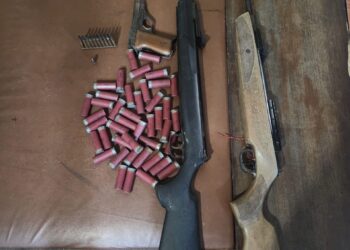Controversy over provision of security on the nation’s waters reechoed over the weekend, when the Nigeria Maritime Administration and Safety Agency (NIMASA) again outlawed use of foreign armed guards, in contravention of existing partnership between the Nigeria Navy and a foreign consortium.
The NIMASA also raised alarm over influx of such vessels, even as it has vowed to arrest them.
Controversy over provision of security on the nation’s waters reechoed over the weekend, when the Nigeria Maritime Administration and Safety Agency (NIMASA) again outlawed use of foreign armed guards, in contravention of existing partnership between the Nigeria Navy and a foreign consortium.
The NIMASA also raised alarm over influx of such vessels, even as it has vowed to arrest them.
The agency also appealed to Nigerian shippers to desist from patronising foreign ships that have foreign guards on board, noting that it is a threat to national security.
This threat was given by the Director General of NIMASA, Dr. Patrick Akpobolokemi who was represented at the 1st Shippers Day Celebration by the agency’s Director of Shipping Development ;Captain Warredi Enisuoh, in Lagos last Friday.
Although he didn’t mention specific parties, but NIMASA’s threat comes months after the umbrella body of majority of foreign ship owners; the Baltic and International Maritime Council (BIMCO) had advised its members not to source for armed guards to man their vessels, except those guards are supplied by the Nigerian Navy in order to avoid liabilities and delays.
Although NIMASA cautioned against use of foreign security guards on board vessels, the Navy is in partnership with a consortium of foreign experts to provide high profile watch for ships.
Shipping Position Daily confirmed that, “there is a partnership project between the Nigerian Navy, Ocean Marine Security (OMS) and technical partner PGS Group”, to “raise awareness on the availability of legalised security options for ships operating in Nigerian waters of West Africa.”
The project saw the establishment in 2013 of the Secure Anchorage Area (SAA) off the coast of Lagos, Nigeria for vessels that require a dedicated and compliant maritime security solution.
For these services, SAA charges $3,000 each for day one and day two followed by $1,500 from day three onwards. Additional escort services can see rates ranging from a low of $4,500 for basic services to a high of $64,000 for lengthier voyage services, inclusive of bunkers.
Owners of the business say,” the SAA is a zone where vessels can anchor safely without fear of pirate attacks and so far the zone has recorded a 100% success rate since operations commenced. Protection can also be provided for vessels conducting Ship-To-Ship (STS) transfers in the adjacent STS zone designated by the Nigerian Ports Authority (NPA).
Nick Dixon, managing director of SAA, pointed out that the SAA zone, which spans a diameter of five nautical miles just south of Lagos port, has a further diametrical two nautical miles of Maritime Exclusion Zone designed to deter potential seaborne threats and protected 24/7 by OMS supported Nigerian Navy patrol boats.
“The OMS supported patrol boats have been approved for use by the Nigerian Navy, given Navy call-signs and have mounted weapons onboard,” Dixon spoke at the residence of the British High Commissioner in Singapore on Tuesday.
“In the event of an attack, this would be considered an attack on the Nigerian Navy, hence all available Nigerian naval assets will be mobilised to assist,” he said, adding that SAA is also a solution recognised publicly by the Nigerian Maritime Administration and Safety Agency (NIMASA) and NPA.
In an apparent defence of its principal, Dixon clarified issue of hiring private armed guards in Nigeria. He pointed out that there is only one version of a Memorandum of Understanding (MoU) that private maritime security companies should obtain if they wish to offer their services in Nigeria, and that all MoUs are signed by the Nigerian Navy’s Chief of Naval Staff.
Continuing, Enisuoh said that for security reason, shippers who patronise ships with foreign guards would not be allowed to discharge their cargoes at the port, pointing out that the agency will ensure that such vessels undergo proper check or risk being impounded.
"We have a new problem and the problem is that a lot of new ships come in carrying foreign guards and there is reason to believe these foreign guards are trained in handling of arms, no doubt about it and this poses a lot of danger to your own security," he said.
He added, that "as you all know, a whole lot of arms come into this country and find themselves in the hands of people possibly not trained to handle them legally. We don't know whether this is a new frontier in the business."
BIMCO is the largest international association representing ship owners and its membership controls around 65 percent of the world’s tonnage with main objective of protecting its members through quality information and advice. Its members cut across more than 120 countries.
Last year, and in an apparent compliance with Nigeria Navy directives, BIMCO warned its members operating vessels within the Nigerian Exclusive Economic Zone (EEZ) and territorial waters to be aware that they may be at risk of potentially significant liabilities and delays if they employ armed guards on board their vessels who are sourced from the Nigerian Marine Police, the Nigerian Police or the Joint Task Force (JTF). Prior to the warning, BIMCO members had been relying on security provided by the Police, and JTF.
Shipping Position Daily also learnt that the Navy actually arrested some operatives of Marine Police last year for providing illegal security services for in-bound ships.
















Discussion about this post